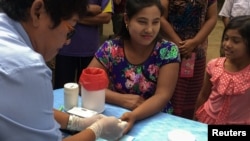ຢາທີ່ມີປະສິດທິພາບທີ່ສຸດທີ່ຖືກໃຊ້ເພື່ອປິ່ນປົວໄຂ້ມາເລເຣຍ ແມ່ນກຳລັງຈະໃຊ້ບໍ່ໄດ້
ຜົນ ໃນຫຼາຍພາກສ່ວນຂອງພາກພື້ນເອເຊຍຕາເວັນອອກສຽງໃຕ້ ແລະ ນອກຈາກວ່າ
ຈະມີການດຳເນີນການຢ່າງວ່ອງໄວ, ມັນອາດຈະນຳໄປສູ່ໄພສຸກເສີນດ້ານສຸຂະພາບ
ທົ່ວໂລກ, ອີງຕາມການເຕືອນຂອງບັນດານັກວິທະຍາສາດ. ຢູ່ໃນວາລະສານ ແລນເຊັດ
(Lancet), ບັນດານັກຄົ້ນຄວ້າຈາກມະຫາວິທະຍາໄລ ມະຫິດົນຂອງ ໄທ ແລະ ມະຫາ
ວິທະຍາໄລ ອັອກສຝອດ (Oxford) ຂອງ ອັງກິດ ກ່າວວ່າ ກາຝາກຕ່າງໆທີ່ນຳພາໂຣກ
ມາເລເຣຍ ແມ່ນກຳລັງພັດທະນາພູມຄຸ້ມກັນ ຕໍ່ຢາປະສົມທີ່ສຳຄັນ ໃນຫຼາຍພາກພື້ນ
ຂອງ ກຳປູເຈຍ, ລາວ, ໄທ ແລະ ຫວຽດນາມ. ນັກຂ່າວວີໂອເອ ເຮັນຣີ ຣິຈ໌ແວລ ມີລາຍ
ງານ, ເຊິ່ງ ພຸດທະສອນ ຈະນຳລາຍລະອຽດມາສະເໜີທ່ານໃນອັນດັບຕໍ່ໄປ.
ລາຍງານໄດ້ເຕືອນວ່າ ກາຝາກ Plasmodium Falciparum ເຊິ່ງເປັນສາເຫດຂອງ
ຮູບແບບໄຂ້ມາເລເຣຍໃນມະນຸດທີ່ຮ້າຍແຮງທີ່ສຸດນັ້ນ, ແມ່ນກຳລັງຈະມີຄວາມຕ້ານ
ທານກັບຢາທີ່ເປັນທາງເລືອກທຳອິດຄື, DHA-piperaquine ໃນຫຼາຍພາກສ່ວນ
ຂອງເຂດເອເຊຍຕາເວັນອອກສຽງໃຕ້, ເຊິ່ງຖືກພົບເຫັນວ່າມີອັດຕາລົ້ມແຫຼວໃນການ
ໃຊ້ກັບມະນຸດເຖິງ 50 ເປີເຊັນຫຼືຫຼາຍກວ່ານັ້ນ.
ສະຖານະການແມ່ນຮຸນແຮງຫຼາຍທີ່ບັນດານັກວິທະຍາສາດເວົ້າວ່າ ຢາປິ່ນປົວດັ່ງກ່າວ
ອາດບໍ່ສາມາດຖືກໃຊ້ໃນ ກຳປູເຈຍ, ຫວຽດນາມ ແລະ ພາກຕາເວັນອອກສຽງເໜືອ
ຂອງ ໄທ, ເພາະວ່າມັນບໍ່ໄດ້ຜົນ ແລະ ເຮັດໃຫ້ຂະຫຍາຍການແຜ່ເຊື້ອມາເລເຣຍຕື່ມ
ອີກ.
ຕ້ອງໄດ້ມີການພິຈາລະນາຄົ້ນຫາການປິ່ນປົວແບບໃໝ່, ອີງຕາມການກ່າວຂອງທ່ານ
ສເຕີຈີອອສ ມອສຈອສ (Sterghios Moschos) ຈາກມະຫາວິທະຍາໄລ ນໍທຳເບຍ
(Northumbia).
ທ່ານ ມອສຈອສ ໄດ້ກ່າວວ່າ “ມັນອາດເປັນໂອກາດທີ່ເໝາະສົມໃນເວລານີ້ ທີ່ຈະຄົ້ນ
ຫາວ່າ ພວກເຮົາຄວນນຳເອົາການປິ່ນປົວລັກສະນະໃໝ່ທີ່ແຕກຕ່າງກັນມາເຂົ້າກັນ
ສະນັ້ນເມື່ອບັນຫາເລີ່ມໃຫຍ່ຂຶ້ນ ມັນກໍຈະມີການແກ້ໄຂທີ່ອາດໄດ້ຜົນໃນລະດັບຢາ
ຫຼາຍຊະນິດ.”
ລາຍງານໄດ້ກ່າວວ່າ ການດຳເນີນການອັນຮີບດ່ວນໃນຕອນນີ້ແມ່ນມີຄວາມຈຳເປັນ
ເພື່ອລົບລ້າງເຊື້ອມາເລເຣຍ ຟາລຊິພາຣຳ ເຊິ່ງແມ່ນມາເລເຣຍ ຊະນິດຮ້າຍແຮງທີ່ສຸດ
ຈາກພາກພື້ນດັ່ງກ່າວ, ບໍ່ເຊັ່ນນັ້ນ ສາຍພັນຕ້ານທານຢາຂອງ ກາຝາກດັ່ງກ່າວກໍອາດ
ຈະແຜ່ລາມອອກໄປຫາບ່ອນອື່ນໆຂອງ ເອເຊຍ ແລະ ອາຟຣິກາ, ເຊິ່ງມີຄວາມເປັນ
ໄປໄດ້ທີ່ຈະກໍ່ໃຫ້ເກີດພາວະສຸກເສີນດ້ານສຸຂະພາບໃນທົ່ວໂລກ.
ທ່ານ ມອສຈອສ ໄດ້ກ່າວວ່າ “ທັງໝົດທີ່ມັນຕ້ອງການກໍແມ່ນເຮືອ ທີ່ມີຄົນຕິດເຊື້ອ, ຫຼື
ອ່າງນ້ຳບ່ອນທີ່ມີຍຸງຢູ່, ຖືກນຳເຂົ້າໄປໃນ ອາຟຣິກາ. ແລ້ວຢ່າງຊ້າໆ ກາຝາກນັ້ນກໍຈະ
ສ້າງຖານທີ່ໝັ້ນຄົງ. ແນວໃດກໍຕາມ, ເຫດການທີ່ຄາດວ່າຈະເກີດຂຶ້ນດັ່ງກ່າວ ເຊິ່ງອີງ
ໃສ່ການປັບປຸງການເບິ່ງແຍງສຸຂະພາບແຕ່ລະມື້ໃນ ອາຟຣິກາ ນັ້ນຈະສ້າງໂອກາດ
ໃຫ້ກາຝາກ ພັດທະນາຄວາມຕ້ານທານຂຶ້ນ.”
ປັດຈຸບັນນີ້ການທົດລອງສັກຢາກັນໄຂ້ມາເລເຣຍ ແມ່ນກຳລັງດຳເນີນຢູ່ໃນຫຼາຍປະເທດ
ຂອງ ອາຟຣິກາ. ແຕ່ຢາປະສົມຄື DHA-piperaquine ແມ່ນຍັງຄົງມີຄວາມສຳຄັນໃນ
ການປິ່ນປົວໄຂ້ມາເລເຣຍ ໂດຍສະເພາະໃນປະເທດຕ່າງໆທີ່ມີລະບົບສຸຂະພາບອ່ອນ
ແອ.
ນັບຕັ້ງແຕ່ປີ 2014 ເປັນຕົ້ນມາ, ຄວາມຄືບໜ້າຂອງໂລກຕໍ່ໄຂ້ມາເລເຣຍແມ່ນໄດ້ຢຸດ
ຊະງັກ. ຄາດຄະເນວ່າ ມີ 219 ລ້ານກໍລະນີ ແລະ ການເສຍຊີວິດ 435,000 ຄົນທີ່ກ່ຽວ
ຂ້ອງກັບໄຂ້ມາເລເຣຍໃນປີ 2017, ສ່ວນຫຼາຍແມ່ນເດັກນ້ອຍທີ່ມີອາຍຸຕ່ຳກວ່າຫ້າປີ
ໃນເຂດລຸ່ມທະເລຊາຍ ຊາຮາຣາ.
Scientists warn the most effective drug used to treat malaria is becoming ineffective in parts of Southeast Asia — and unless rapid action is taken, it could lead to a global health emergency.
Writing in the Lancet journal, researchers from Thailand’s Mahidol University and Britain’s Oxford University say parasites that carry malaria are developing resistance to a key drug combination across multiple regions of Cambodia, Laos, Thailand and Vietnam.
The report warns that the parasite Plasmodium falciparum — which causes the most lethal form of human malaria — is becoming resistant to the first-choice drug, DHA-piperaquine, in parts of Southeast Asia, with patients seeing a failure rate of 50 percent or more.
The situation is so critical that scientists say the treatment should not be used in Cambodia, Vietnam and northeast Thailand, because it is ineffective and contributes to increased malaria transmission.
New treatments must be considered, says Sterghios Moschos of the University of Northumbria.
“It might be opportune at this point in time to explore whether or not we should bring together different new classes of medications so that when the problem starts becoming more substantial, there is a solution potentially that works at the multi-drug level,” said Moschos.
The report says urgent action is now needed to eliminate falciparum malaria from the region — otherwise the resistant strains of the parasite could further spread to other parts of Asia and Africa, potentially causing global health emergency.
“All it takes is a ship with infected individuals, or a pool of water where mosquitoes are, getting into Africa and then slowly that parasite establishing a foothold," he added. "The likely scenario, however, will be that improvement of health care on a day-to-day basis in Africa will create the opportunity for the parasite to evolve resistance.”
Currently, malaria vaccine trials are under way in several African countries. But drug combinations like DHA-piperaquine remain vital in treating malaria — especially in countries with poor health systems.
Since 2014, global progress against malaria has stalled. There were an estimated 219 million cases and 435,000 related deaths in 2017, most of them children under the age of five in sub-Saharan Africa.





